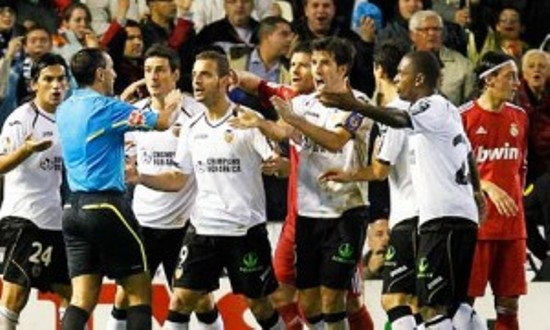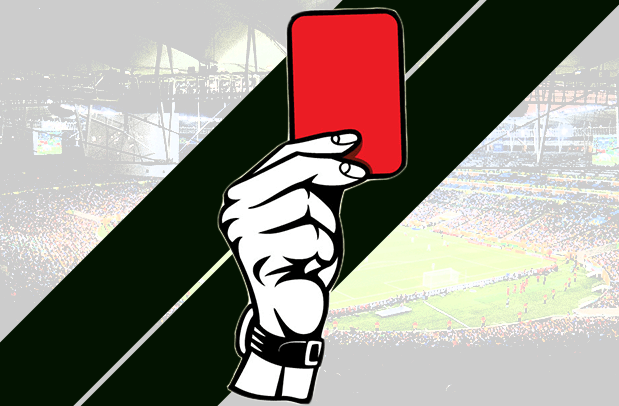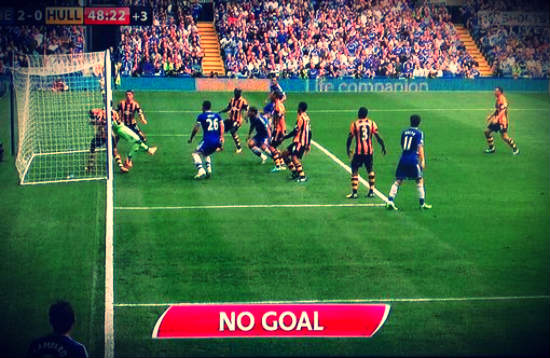Despite the dynamic nature of a football season, the presence of a particular constant can always be taken for granted. Regardless of the teams on the field or even geographical location of the venue, one thing is rest assured, where there is football, there will be contentious decisions by the referee. Unfortunately this relationship isn’t symbiotic. In actual reality, it’s the complete opposite. Although in a larger scheme of things, a couple of wrong decisions may look insignificant especially when pitted against plenty of correct ones, like any parasite, it belies its size and magnitude and tries to eat its host inside out. Much to the anguish of football fans, in this analogy their beloved sport has slotted in seamlessly to the role of host.
After the FA Cup weekend, once again the focus was mainly on one incident. There were 32 matches that were played in the weekend but unsurprisingly the talk of the town was what turned out to be the winning goal in the match between non-League Mansfield Town and Liverpool FC. The fact that it was Luis Suarez was at the centre of it all accentuated the spotlight on the incident. As a side note, I personally thought it was a instinctive move from the Liverpool forward and not a case of blatant cheating but that is hardly the point. The end of the day it was Mansfield Town who have the right to feel aggrieved. The players and managers could have been looking forward to a dream match in the form of a replay at Anfield. Yes Liverpool probably may have eked out a winner anyway but there is no way to say that for sure. Yet another week and surprise surprise poor officiating is on everyone’s lips again.
A referee’s job is a thankless one. He could have a stormer of a game for 90 minutes and get every decision right only to be castigated for one wrong move which would’ve played a pivotal role in the outcome of the match. The bias of supporters doesn’t really help either. Stonewall penalties have the odd habit of miraculously transforming into ‘soft penalties’ and various forms of social media will be teeming with still pictures of ‘ghost goals’ or wrongly disallowed ones just minutes after the incident. In this age of technology, referees have absolutely nowhere to hide.
If the popular adage of ‘It evens out over the course of the season’ is to believed then I must say God is a very conscientious football fan. Maybe with a slightly twisted sense of humour and apparent lack of concern towards the blood pressure of fellow football fans! But anyway let us assume that it in fact does not even out. In sport, the line between victory and failure is microscopically thin. For proof look no further than May 13th of last year. Manchester United were the Champions elect of England for all of 2 minutes before news of a remarkable turnaround at the Etihad filtered through. And it’s not only at the top of the table that a single decision could have major ramifications. Relegation could come down to a couple of points as well.
So what can be done you ask? Video referrals booms back a loud voice (somebody elses, mine is unfortunately not very loud). Football wouldn’t be the first to go down the route of video referrals. Most notably, in the NFL, teams are given two replay challenges per game, and can be awarded a third one if the other two are successful. In tennis as well, the use of the hawk eye system has been used as a tool to help resolve marginal calls. Hockey is another sport which has adopted a similar system. To a lesser extent of success, cricket has implemented the ‘Umpire Decision Review System’ but the pitfalls of predictive analysis has limited its use.
I would be the first to agree that the potential adoption of a system consists of an inherent set of disadvantages. However, I believe by defining certain constraints, football could greatly benefit from such a system. In my opinion, the system should be used as tool to ease the burden of a referee without interfering with his job. The system I am proposing works in the following manner. Each team would have one unsuccessful challenge per half. In such an event the initial decision of the referee would be over ruled if there was any evidence to the contrary.
I will explain further but first let’s look at the obvious advantages of such a system.
ADVANTAGES:
The main advantage of a referral system is obviously the elimination of ‘howlers’ from the game. If teams feel hard done by a decision then they are free to review the same decision and if conclusive evidence is found, the decision can be overturned. The most common defence given to referees is that he sees the incident in real time and has only one chance to do so whereas we have the benefit of a number of replays. Then why not equip professionally trained referees with the same benefit?
DISADVANTAGES:
- Flow of the game is interrupted
A popular problem with the system is that it would disrupt the flow of the game. A simple solution to this problem would be to limit the number of challenges a team can make. A system of one unsuccessful referral per half seems to be a suitable middle ground. It would make sure referrals aren’t wasted and also that as long as the referrals are right, then the teams are welcome to keep challenging decisions. Either way more often than not, controversial decisions are followed by players surrounding the referees so I don’t see how this would be a major problem.
- Unnecessary use
Indiscriminate use of challenges is another potential pitfall of this system. This drawback can be easily curtailed in the same manner of the problem above by limiting the number of unsuccessful challenges. It is also feared that teams could use it as a time wasting tactic in injury time. The time would be added to the initial period of injury time much in the same manner as substitutions.
- Referee is undermined
The importance of a referee’s role in a match could possibly be marginalized with the introduction of such a system. But with the system in the above manner, the system would not interfere with the referee. Also in the event of a wrong decision in a high profile game, the referees are subjected to dog’s abuse. Surely something that would make their job easier would be a welcome addition.
- Grey area
The biggest problem with this system is when even after multiple replays a definite decision cannot be made. A lot of the rules of football are open to interpretation by the referees. This subjective nature of the laws will no doubt give rise to further debate rather than resolution of the problem. Another possible scenario where the system could come up short is one where two wrongs actually do make a right. Suppose a foul in the build up has been missed and in the subsequent play, a goal is wrongly disallowed for offside. In this case a reversal of the offside call would result in the wrong decision!
Football has been crying out for the introduction of goal line technology for quite some time now. I, along with plenty of other people believe that the implementation of goal line technology in the Premier League is a massive boost to ridding the game of howlers. Its introduction has paved the path for the implementation of more technology and in my opinion a referral system would benefit the game. Saying that, I’m not naive enough to think that such a system would eradicate all errors. However to me it looks like an improvement and that is reason enough for it’s implementation. The beauty of football is often overlooked in eagerness of fans to nitpick and criticize displays of the referee. It’s time to put the spotlight back on the football itself.
- Deconstructing the Perfect Counter-Attack - June 19, 2020
- The Battle For Indian Football’s Soul - May 19, 2020
- Bengaluru FC 2-1 FC Goa | Gritty Blues eke out an important win - January 6, 2020
























































